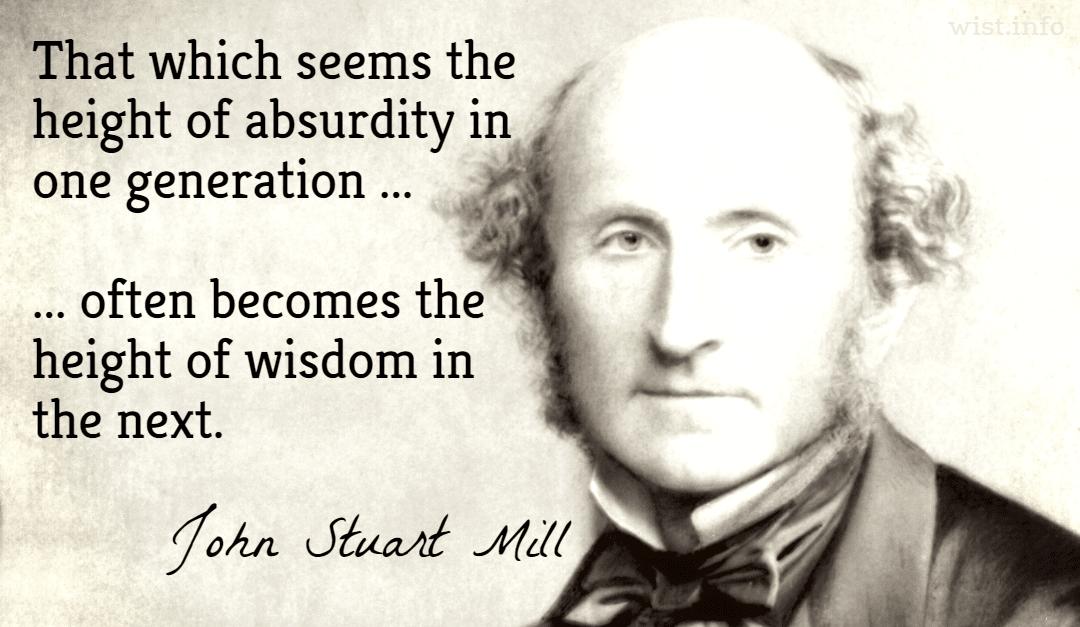I don’t think he had known much demonstrative love in his childhood and what a child doesn’t receive he can seldom later give.
P. D. James (1920-2014) British mystery writer [Phyllis Dorothy James White]
Time To Be in Earnest: A Fragment of Autobiography, “Diary 1997” (1999)
(Source)
Writing of her father. Often just the last half of this quote is given ("What a child ...").
Quotations about:
generations
Note not all quotations have been tagged, so Search may find additional quotes on this topic.
The central task of education is to implant a will and facility for learning; it should produce not learned but learning people. The truly human society is a learning society, where grandparents, parents, and children are students together.
Eric Hoffer (1902-1983) American writer, philosopher, longshoreman
Reflections on the Human Condition, ch. 1, # 32 (1973)
(Source)
For Freedom’s battle once begun,
Bequeathed by bleeding Sire to Son,
Though baffled oft is ever won.
Few match their fathers. Any tongue can tell
The more are worse: yea, almost none their sires excel.[παῦροι γάρ τοι παῖδες ὁμοῖοι πατρὶ πέλονται,
οἱ πλέονες κακίους, παῦροι δέ τε πατρὸς ἀρείους.]Homer (fl. 7th-8th C. BC) Greek author
The Odyssey [Ὀδύσσεια], Book 2, l. 276ff (2.276) [Athena to Telemachus] (c. 700 BC) [tr. Worsley (1861), st. 37]
(Source)
(Source (Greek)). Alternate translations:
For few, that rightly bred on both sides stand,
Are like their parents, many that are worse,
And most few better. Those then that the nurse
Or mother call true-born yet are not so,
Like worthy sires much less are like to grow.
[tr. Chapman (1616)]
Few sons exceed or reach their father’s might,
But commonly inferior they are.
[tr. Hobbes (1675), l. 257ff]
Few sons attain the praise
Of their great sires, and most their sires disgrace.
[tr. Pope (1725)]
Few sons their fathers equal; most appear
Degenerate; but we find, though rare, sometimes
A son superior even to his Sire.
[tr. Cowper (1792)]
Few be the children equal to their father:
The most be worse: and few be better men.
[tr. Bigge-Wither (1869)]
For few children, truly, are like their father; lo, the more part are worse, yet a few are better than the sire.
[tr. Butcher/Lang (1879)]
Though not oft is the son meseemeth e'en such an one as his sire.
Worser they be for the more part, and a few may be better forsooth.
[tr. Morris (1887)]
Few sons are like their fathers; most are worse, few better than the father.
[tr. Palmer (1891)]
Sons are seldom as good men as their fathers; they are generally worse, not better.
[tr. Butler (1898)]
Few sons indeed are like their fathers; most are worse, few better than their fathers.
[tr. Murray (1919)]
Few are the sons who attain their fathers' stature: and very few surpass them. Most fall short in merit.
[tr. Lawrence (1932)]
Few sons, indeed, are like their fathers. Generally they are worse; but just a few are better.
[tr. Rieu (1946)]
The son is rare who measures with his father,
and one in a thousand is a better man.
[tr. Fitzgerald (1961)]
For few are the children who turn out to be equals of their fathers,
and the greater number are worse; few are better than their father is.
[tr. Lattimore (1965)]
Few sons are the equals of their fathers;
most fall short, all too few surpass them.
[tr. Fagles (1996)]
You know, few sons turn out to be like their fathers;
Most turn out worse, a few better.
[tr. Lombardo (2000), ll. 300-301]
It is a truth that few sons are the equal of their fathers; most are inferior to their father, and few surpass them.
[tr. Verity (2016), l. 276]
And it is rare for sons to be like fathers;
only a few are better, most are worse.
[tr. Wilson (2017)]
It’s true few men
are like their fathers. Most of them are worse.
Only very few of them are better.
[tr. Johnston (2019), l. 373ff]
To be unacquainted with what has passed in the world, before we came into it ourselves, is to be always children. For what is the age of a single mortal, unless it is connected, by the aid of History, with the times of our ancestors?
[Nescire autem quid ante quam natus sis acciderit, id est semper esse puerum. Quid enim est aetas hominis, nisi ea memoria rerum veterum cum superiorum aetate contexitur?]
Marcus Tullius Cicero (106-43 BC) Roman orator, statesman, philosopher
Brutus, ch. 34, sec. 120 (55 BC) [tr. Jones (1776)]
(Source)
The original Latin. Alt. trans.
- "For not to know what happened before one was born, is to be a boy all one s life. For what is the life of a man unless by a recollection of bygone transactions it is united to the times of his predecessors?" [tr. Yonge (1853)]
- "To be ignorant of what happened before you were born is to remain always a boy. For what is the lifetime of a man, unless it is connected with the lifetime of older men by the memory of earlier events?" [tr. Fox (2007)]
- "What is a generation, if it is not conjoined with the age of our predecessors by the memory of ancient things?" [tr. @sentantiq]
- "Not to know what happened before you were born is to be a child forever. For what is the time of a man, except it be interwoven with that memory of ancient things of a superior age?"
- "Not to know what happened before you were born is always to be a boy."
- "To be ignorant of the past is to be forever a child."
As is the generation of leaves, so is that of humanity.
The wind scatters the leaves on the ground, but the live timber
Burgeons with leaves again in the season of spring returning.
So one generation of men will grow while another dies.[Οἵη περ φύλλων γενεὴ τοίη δὲ καὶ ἀνδρῶν.
φύλλα τὰ μέν τ’ ἄνεμος χαμάδις χέει, ἄλλα δέ θ’ ὕλη
τηλεθόωσα φύει, ἔαρος δ’ ἐπιγίγνεται ὥρη·
ὣς ἀνδρῶν γενεὴ ἣ μὲν φύει ἣ δ’ ἀπολήγει.]Homer (fl. 7th-8th C. BC) Greek author
The Iliad [Ἰλιάς], Book 6, l. 146ff (6.146-149) (c. 750 BC) [tr. Lattimore (1951)]
(Source)
Like the race of leaves
The race of man is, that deserves no question; nor receives
My being any other breath? The wind in autumn strows
The earth with old leaves, then the spring the woods with new endows;
And so death scatters men on earth, so life puts out again
Man’s leavy issue.
[tr. Chapman (1611), l. 141ff]
Like leaves on trees the race of man is found,
Now green in youth, now withering on the ground:
Another race the following spring supplies,
They fall successive, and successive rise:
So generations in their course decay;
So flourish these, when those are past away.
[tr. Pope (1715-20)]
For, as the leaves, such is the race of man.
The wind shakes down the leaves, the budding grove
Soon teems with others, and in spring they grow.
So pass mankind. One generation meets
Its destined period, and a new succeeds.
[tr. Cowper (1791), l. 175ff]
As is the race of leaves, even such is the race of men. Some leaves the wind sheds upon the ground, but the fructifying wood produces others, and these grow up in the season of spring. Such is the generation of men; one produces, another ceases.
[tr. Buckley (1860)]
The race of man is as the race of leaves:
Of leaves, one generation by the wind
Is scatter'd on the earth; another soon
In spring's luxuriant verdure bursts to light.
So with our race; these flourish, those decay.
[tr. Derby (1864)]
Even as are the generations of leaves such are those likewise of men; the leaves that be the wind scattereth on the earth, and the forest buddeth and putteth forth more again, when the season of spring is at hand; so of the generations of men one putteth forth and another ceaseth.
[tr. Leaf/Lang/Myers (1891)]
Men come and go as leaves year by year upon the trees. Those of autumn the wind sheds upon the ground, but when spring returns the forest buds forth with fresh vines. Even so is it with the generations of mankind, the new spring up as the old are passing away.
[tr. Butler (1898)]
Even as are the generations of leaves, such are those also of men. As for the leaves, the wind scattereth some upon the earth, but the forest, as it bourgeons, putteth forth others when the season of spring is come; even so of men one generation springeth up and another passeth away.
[tr. Murray (1924)]
Very like leaves upon this earth are the generations of men -- old leaves, cast on the ground by wind, young leaves the greening forest bears when spring comes in. So mortals pass; one generation flowers even as another dies away.
[tr. Fitzgerald (1974)]
Like the generations of leaves, the lives of mortal men.
Now the wind scatters the old leaves across the earth,
now the living timber bursts with the new buds
and spring comes round again. And so with men:
as one generation comes to life, another dies away.
[tr. Fagles (1990), ll. 171-75]
That which seems the height of absurdity in one generation often becomes the height of wisdom in the next.
John Stuart Mill (1806-1873) English philosopher and economist
(Attributed)
(Source)
Often cited from a quote in Adlai Stevenson, Call to Greatness (1954), but appears earlier in, e.g., National Magazine (Nov 1911). Unverified in Mills' writings.
The ultimate test of man’s conscience may be his willingness to sacrifice something today for future generations whose words of thanks will not be heard.
Gaylord Nelson (1916-2005) American politician and environmentalist
“Ah, Wilderness! Save It,” New York Times (4 Sep 1984)
(Source)
Time indeed changes manners and notions, and so far we must expect institutions to bend to them. But time produces also corruption of principles, and against this it is the duty of good citizens to be ever on the watch, and if the gangrene is to prevail at last, let the day be kept off as long as possible.
Thomas Jefferson (1743-1826) American political philosopher, polymath, statesman, US President (1801-09)
Letter to Spencer Roane (9 Mar 1821)
(Source)
Times change. The vices of your age are stylish today.
Aristophanes (c. 450-c. 388 BC) Athenian comedic playwright
The Clouds, l. 914 (c. 423 BC) [tr. Arrowsmith (1962)]
This phrase comes from a single translation, by William Arrowsmith (1962), of Aristophanes, The Clouds, l. 914. It is the only translation that includes anything like that:
[909] Philosophy: Why, you Precocious Pederast! You Palpable Pervert!
[910] Sophistry: Pelt me with roses!
[910] Philosophy: You Toadstool! O Cesspool!
[911] Sophistry: Wreath my hairs with lilies!
[911] Philosophy: Why, you Parricide!
[912] Sophistry: Shower me with gold! Look, don't you see I welcome your abuse?
[913] Philosophy: Welcome it, monster? In my day we would have cringed with shame.
[914] Sophistry: Whereas now we're flattered. Times change. The vices of your age are stylish today.
Compare to Hickey (1853):[909] Just Cause: You are debauched and shameless.
[910] Unjust Cause: You have spoken roses of me.
[910] Just Cause: And a dirty lickspittle.
[911] Unjust Cause: You crown me with lilies.
[911] Just Cause: And a parricide.
[912] Unjust Cause: You don't know that you are sprinkling me with gold.
[913] Just Cause: Certainly not so formerly, but with lead.
[914] Unjust Cause: But now this is an ornament to me.
The freethinking of one age is the common sense of the next.
Among other things, you’ll find that you’re not the first person who was ever confused and frightened and even sickened by human behavior. You’re by no means alone on that score, you’ll be excited and stimulated to know. Many, many men have been just as troubled morally and spiritually as you are right now. Happily, some of them kept records of their troubles. You’ll learn from them — if you want to. Just as someday, if you have something to offer, someone will learn something from you. It’s a beautiful reciprocal arrangement. And it isn’t education. It’s history. It’s poetry.
Croesus said to Cambyses: That peace was better than war; because in peace the sons did bury their fathers, but in wars the fathers did bury their sons.
Francis Bacon (1561-1626) English philosopher, scientist, author, statesman
Apophthegms, #149 (1625)
See Herodotus.














